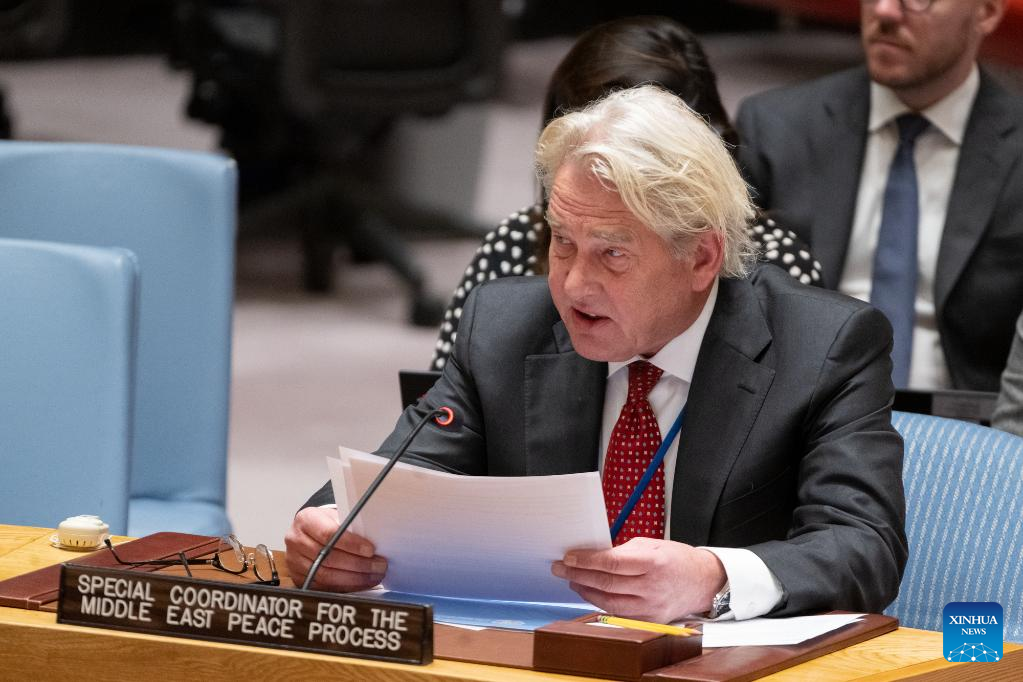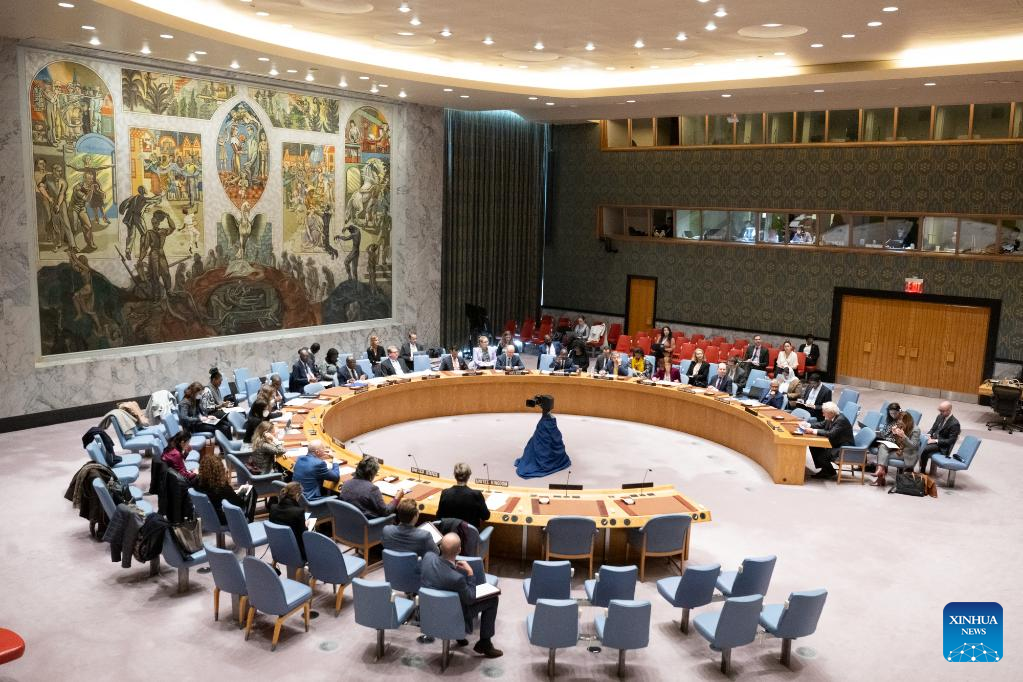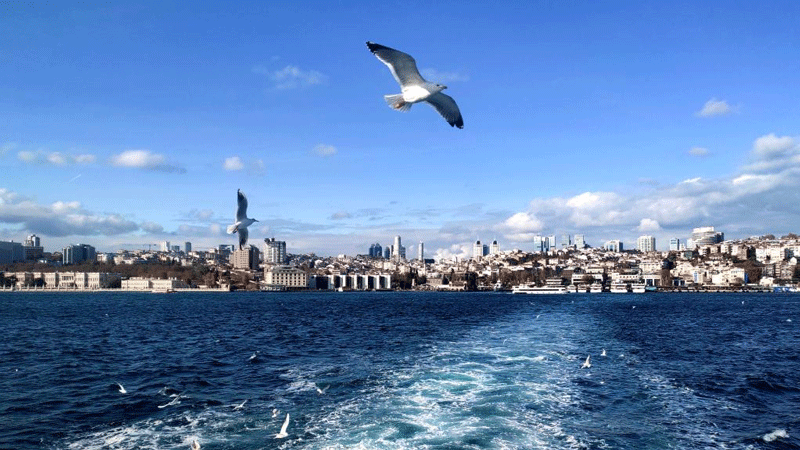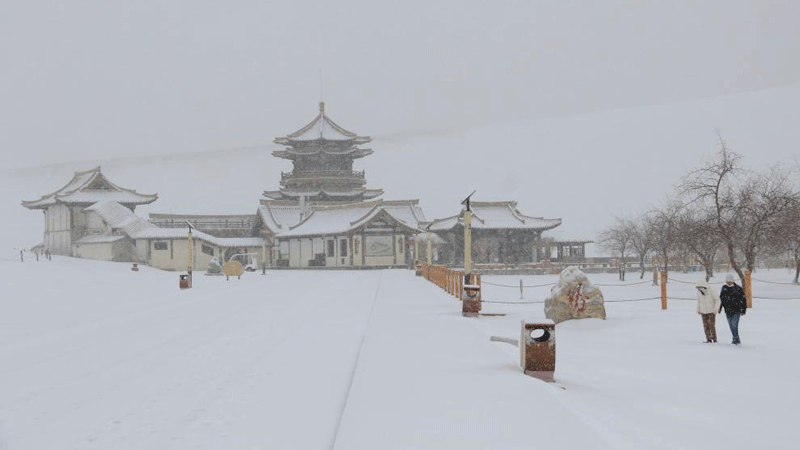UN Mideast envoy calls for urgent steps toward two-state solution

UN Special Coordinator for the Middle East Peace Process Tor Wennesland (Front) speaks at a Security Council meeting on the situation in the Middle East, including the Palestinian question, at the UN headquarters in New York, on Nov. 28, 2022. (Eskinder Debebe/UN Photo/Handout via Xinhua)
UNITED NATIONS, Nov. 28 (Xinhua) -- UN Special Coordinator for the Middle East Peace Process Tor Wennesland on Monday called for urgent steps toward a two-state solution to the Israeli-Palestinian conflict.
"It is necessary to take urgent steps toward a two-state solution, which still garners considerable support among Palestinians and Israelis. Through incremental but tangible steps, we can build a bridge between where we are now and the conditions necessary for a peaceful resolution of the conflict based on United Nations resolutions, international law and previous agreements," he told the Security Council in a briefing.
The first step is to continue to engage with the parties to reduce tensions and counter negative trends, particularly those impacting final-status issues, he said.
This will involve reining in violence and incitement and holding perpetrators accountable. This means that both sides stop unilateral steps that undermine peace, including settlement expansion or legalization, demolitions and displacement. This means upholding the status quo at the Holy Sites in accordance with the special and historic role of Jordan, he said.
The second step is to continue to improve access, movement and trade to create room for the Palestinian economy to grow, said the envoy.
Specifically, steps should be taken to increase access for Palestinians to land and resources in Area C of the West Bank, which is under full Israeli control. In Gaza, a further and more comprehensive approach to easing restrictions on the movement of people and goods is needed. Re-linking the economy of Gaza to the West Bank should be a related, critical objective. Ultimately, ending the debilitating closure and addressing Gaza's challenges require political solutions in line with Security Council Resolution 1860, he said.
The third step is to strengthen Palestinian institutions, improve governance and shore up the fiscal health of the Palestinian Authority (PA), said Wennesland.
The PA's political legitimacy and accountability must also be strengthened through democratic reforms and opening of the civic space, holding elections across the occupied Palestinian territory and ensuring the effectiveness and credibility of the Palestinian security forces, he said.
Wennesland cautioned that without the first two steps, the third step will not be possible.
"These steps seek to enable the parties to move past ad-hoc efforts focused on security and economic matters, and toward meaningful engagement on more fundamental political issues," he said. "While they are intended to have immediate, concrete benefits for Palestinians and Israelis, these priorities are anchored to a broader political framework that advances us toward two states."
After decades of persistent violence, illegal settlement expansion, dormant negotiations and deepening occupation, the Israeli-Palestinian conflict is again reaching a boiling point. High levels of violence in the occupied West Bank and Israel in recent months, the increased use of arms, and settler-related violence, have caused grave human suffering, said Wennesland.

UN Security Council holds a meeting on the situation in the Middle East, including the Palestinian question, at the UN headquarters in New York, on Nov. 28, 2022. (Eskinder Debebe/UN Photo/Handout via Xinhua)
This surge in violence in the occupied Palestinian territory is taking place in the context of a stalled peace process and entrenched occupation, and amid mounting economic and institutional challenges faced by the PA. Global trends and declining donor support have compounded these challenges, alongside an absence of democratic renewal for the Palestinian people, he said.
While it may seem that events on the ground are stuck in a never-ending cycle, the truth is that nothing in this conflict is static. Freezing the conflict or permanently managing it are not viable options, he said.
As violence mounts, settlement expansion and restrictions continue to squeeze the economic and physical space for developing a viable Palestinian state. Meanwhile, demography is moving faster than politics. In a few years, exponential population growth in the West Bank and Gaza will it make it increasingly difficult, if not impossible, to manage the economic, political and security situation, he warned.
The PA is already facing significant institutional and financial challenges. Palestinians have not voted in general elections since 2006. More than 50 percent of the electorate -- those aged 18 to 35 -- has never had the chance to make their voices heard by the ballot, he said.
This is taking place against the backdrop of changing dynamics in the region, shifting international priorities, and more recently, the fallout of the conflict in Ukraine, which have significantly reduced the attention paid to the Israeli-Palestinian conflict. The optimism, hope, and vocal support for a negotiated political solution that were so palpable when the peace process began have now dimmed, especially given the lack of political progress since the unsuccessful rounds of talks in 2007 and 2014. The principles that underpin the Oslo Accords are slipping away, he noted.
Political leadership is required to reset a trajectory toward a two-state solution, said Wennesland.
Failing to address the underlying causes of conflict as well as the above-mentioned negative trends, and without demonstrating a clear political path forward, the conflict will only escalate, causing more bloodshed and misery, and having a deeply destabilizing effect on the entire region, he warned.
"The current trends bring neither stability nor security for anyone," he added.
Wennesland recognized that under the current circumstances, advancing the above-mentioned three steps will be a formidable task.
Fundamental issues need to be addressed by the parties. A common approach where the two-state solution is the guiding political direction is essential to halting the current negative trajectory. It will require a redoubled commitment from the international community as well as coordinated and sustained attention, resources and engagement with the parties, despite the global challenges, he said.
Such a direction has full support from the international community. In this regard, the United Nations plays a critical role in anchoring and affirming the international consensus on how this conflict will ultimately be resolved: the establishment of two states, living side-by-side in peace and security, on the basis of the 1967 lines, in line with UN resolutions, international law and previous agreements, he said.
This consensus is based on the recognition that both Palestinians and Israelis have deep national, religious, cultural and historic ties to their homeland, and that both have a right to self-determination in the form of a viable, contiguous, independent state of their own, he said.
Ultimately, only Palestinians and Israelis can together determine their future. But the United Nations and the international community, including through regional and international frameworks, must support the parties in moving toward a political horizon aligned with the core principles, said Wennesland. "Despite the bleakness of this moment, and in fact because of it, I encourage all of us to recommit to this ambitious but achievable goal."
Photos
Related Stories
- UN chief calls for action in 3 areas to prevent disaster of biological weapons
- UN calls for eliminating violence against women, girls
- UN chief calls for equalizing availability, quality of HIV treatment
- UN voices concern about deadly explosive remnants of war in Libya
- UN official calls for long-term approach to eliminate threat of piracy in Gulf of Guinea
- UN chief appoints new resident coordinator for Central African Republic
Copyright © 2022 People's Daily Online. All Rights Reserved.









